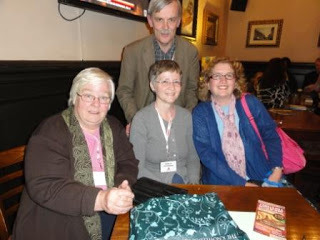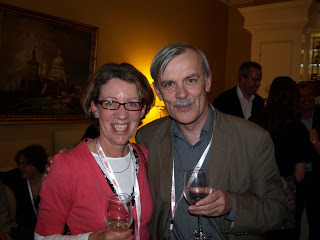Martin Edwards's Blog, page 266
May 23, 2011
More on Crimefest
I'm working away from home for a couple of days, so just a few more brief thoughts on Crimefest for the time being.
I enjoyed moderating two panels, the first being Forgotten Authors, with some great panellists - Adrian Magson, Peter Guttridge, Caroline Todd and Sarah Rayne. There was so much to say about our chosen authors of the past - the only problem was that we could have talked for hours! I've been asked by the organisers to moderate the same panel again next year.
I also moderated an interesting panel which featured the very witty Caro Ramsay, along with M.R. Hall, Yrsa Sigursdottir and John Lawton. A varied group and a discussion which I felt was full of thought-provoking contributions. I was glad to meet John and Yrsa for the first time.
Two of the people I enjoyed chatting with at different times during the weekend deserve particular congratulations. Len Tyler won the Last Laugh award, and Paul Johnston, despite much modest self deprecation, won Mastermind in the face of formidable competition. Both Len and Paul have new books out shortly and I look forward to reading both of them. A word of appreciation too for Maxim Jakubowski, an extremely able quizmaster and question setter.
May 22, 2011
Crimefest



Crimefest 2011 was thoroughly enjoyable, and for me it offered a chance to relax from the frenetic activity at work following our recent business merger. I spent much more time chatting to friends old and new than attending panels, though I did enjoy all those I did attend. And happily I found time to do a bit of work on and thinking about my plans for the next Lake District Mystery.
Our pub quiz team, the International Bloggers, included Karen Meek of Eurocrime, Dorte from Denmark and Kerrie Smith from Mysteries in Paradise. We didn't make a great start, and shamefully I managed not to recognise Jane Marple from Peter Guttridge's cleverly selective description, but we did have productive rounds involving anagrams and Hitchcock movies, and were rewarded with some freebie books and audio books. It was a great pleasure to meet Dorte and Kerrie and their husbands. As always, Peter did a great job with the quiz questions.
Karen kindly sent me the photo of the quiz team. And Pauline Rowson (who also blogs splendidly) sent me the other two photos, taken by her husband Bob. Pauline and I first met a few years back at a TV studio. The full story is less glamorous, we agreed, than it sounds, but it was great to see her and Bob again. One photo shows me with Pauline, the other was taken at the Severn House drinks reception, and features Peter Guttridge, Ann Cleeves, Michael Walters (someone else I was delighted to have the chance to chat to at some length) and Maureen Carter.
I'll post a bit more about Crimefest - when I get my breath back!
May 19, 2011
Forgotten Book - The Problem of the Green Capsule
My choice for today's Forgotten Book is another title by John Dickson Carr that has happily found a fresh life thanks to the enterprise of James Prichard's Langtail Press. This is The Problem of the Green Capsule, which was first published in 1939. Dickson Carr wanted to call the book The Black Spectacles, and that was the title used in the UK (and I think, given the storyline, he was right and his American publishers rather missed the point.)
After some scene setting in Pompeii, the action switches to a quintessential English village, Sodbury Cross. Someone's been poisoning chocolates, and an attractive young woman called Marjorie Wills is a possible suspect. Her rich uncle, Marcus Chesney, a man with an ingenious turn of mind but a habit of penny-pinching, dreams up an elaborate charade intended to cast light on the mystery. Of course, in Golden Age detective fiction, a tendency to over-elaborate is a fatal characteristic of both murderers and victim alike, and so it proves here. Needless to say, Marcus ends up dead, poisoned by the eponymous green capsule.
Another murder occurs, and Dr Gideon Fell, who has been taking the waters at Bath, is called in to assist the baffled police. This is not a "locked room mystery" of the type for which Dickson Carr was renowned, but there is some jiggery-pokery with a clock and with the film of Marcus Chesney's charade which contribute to the puzzle. As always with the best of John Dickson Carr, the mystery is ingenious and atmospheric, and I did not guess the solution.
One of the features of this novel which particularly interested me was the way in which Carr used elements from real-life murder cases to cast light upon the events of the story. He was fascinated by true crime, and made excellent use of his knowledge. I'm certainly planning to read more of his books to see whether this was a recurrent feature of his work.
May 17, 2011
Planting Clues
When I reviewed the new Peter Lovesey novel, Stagestruck, recently, I mentioned that it is a very good example of how an accomplished detective story writer who wants to "play fair" with the reader plants clues in an artful manner.
As a seasoned reader of detective fiction, I felt rather pleased with myself when I spotted a throwaway line describing the background of one of the characters. I figured that this pointed the way to identifying the culprit's motive, and I could not resist the temptation to construct my own explanation of events, as well as identifying a suitably unlikely suspect.
But I have to confess that Peter Lovesey outwitted me. I had spotted the right clue, and the motive, but I had missed an earlier clue that led to an entirely different outcome – one I'd thought about for a nanosecond, but dismissed. That earlier clue, if spotted, gives the game away – a bold and confident move by a writer on top form. It reminded me of a very clever early Reginald Hill book, where the key clue crops up in the very first sentence – bravura clueing, to be sure.
Agatha Christie is rightly regarded as the best in the business at clueing, but a number of modern writers take it seriously. I've always been rather proud of a clue planted in my first book, All the Lonely People, and another in Eve of Destruction, as well as some of those that crop up in the Lake District Mysteries. It's really a game with the reader – not the crux of the novel, to be sure, but I find it great fun, and so, I think, does Peter Lovesey.
May 15, 2011
Vera and Crimefest
The first series of Vera, starring Brenda Blethyn, came to an end tonight with an adaptation of The Crow Trap by Stephen Brady. The story opens with the murder of a woman who is resisting an attempt to build a new quarry in the beautiful Northumberland countryside, and it soon becomes clear that a mystery from the past is entwined with the puzzle of the present.
This was a well-structured episode, and a suitable finale for what has been a successful first series. Now that the characters and setting are established, the way is clear for the scriptwriters to introduce the variations of tone and pace that will ensure Vera ranks along with Lewis as the leading detective drama for years to come.
A highlight of Crimefest, which opens in Bristol on Thursday, will be an interview featuring Ann Cleeves and TV writer Paul Rutman, discussing Vera. I'm looking forward to this, as well as to Crimefest as a whole. I'll be moderating two panels, including one on Forgotten Authors.
This time last year I went to Crimefest at a point when I was rather down in the dumps, and it really cheered me up. I was due to appear in the Mastermind quiz, and really wasn't in the mood for it, but all was well in the end. And the fact that I was able to put other concerns aside and focus on the quiz itself gave me a good deal of heart in the weeks that followed. So I do recall Crimefset 2010 with special appreciation, and I'm going to enjoy this year's event in a lighter frame of mind. But I'm glad I don't have to do Mastermind again!
May 12, 2011
The Killing of a Chinese Bookie
The Killing of a Chinese Bookie is a slightly odd film directed by John Cassavettes and starring Ben Gazzara. I had rather mixed feelings about it overall, but I'd heard that it is interesting, and that is true, even though there are one or two boring bits.
Ben Gazzara plays a strip club owner, a man who is affable and extremely pleased with himself and also not particularly intelligent. He loves gambling, and having just paid off one gambling debt, he celebrates by taking his three favourite strippers to another gambling den and squandering a large amount of money that he doesn't actually have. The heavies who run the club demand payment in kind – they want him to gun down a Chinese bookie who has plenty of security protection.
At first, our "hero" demurs; he killed people when fighting in the Korean War, but is not naturally violent. In the end, however, he has little choice but to carry out the assignment. He accomplishes it with remarkable ease, to my mind, but I found it surprising that this aspect of the story was treated as relatively insignificant. Much more time is devoted to life in the strip club, and these scenes become rather tedious.
In essence, this film struck me as being a study of a deeply flawed character. Ben Gazzara is excellent, offering a rounded portrayal of someone who could easily seem quite appalling. The plot is slender, though, and I was startled to learn that the original version of the movie was much longer. Cutting it was a good idea, and possibly the cuts should have been more ruthless. All the same, although it is no masterpiece, I thought it was well worth watching.
The Blue Geranium
The Blue Geranium started life as a short story, and I was rather surprised to find that it had been turned into a two-hour drama for Agatha Christie's Marple. A number of Christie's short stories which have been turned into sixty minute episodes have seemed rather padded-out. So I did not watch the show first time around, but finally I have weakened and given it a try.
Unexpectedly, I thought it was pretty good. Needless to say, the scriptwriter, Stewart Harcourt, had to invent a great deal of plot material, but I felt he managed to accomplish the rather difficult task of blending the old and new. And I was amused to see in the cast list that the three small children who discovered a body near a river were young Harcourts – he and they must have enjoyed that! As ever, the cast was strong, and included Caroline Catz, whom I rather liked in that otherwise patchy series of a few years back, Murder in Suburbia.
I have always thought that Agatha Christie was a far better novelist than a short story writer, even though admittedly she did write quite a number of really good short stories. "The Blue Geranium" in its original form was enjoyable, and it is to be found in the first and strongest collection of Miss Marple short stories, The thirteen problems.
Watching this episode made me think that there is a particular knack to adapting a short story for television. It is sometimes done well (for instance, with some of the Sherlock Holmes adaptations that we have seen over the years) but often the results are disappointing. The reality is that, usually, the source material needs to be changed and expanded, perhaps radically. In recent times, some of the "improvements" on Christie plots have been deeply unappealing. But not, I felt, in the case of The Blue Geranium.
Shutter Island
Dennis Lehane must have been delighted with the film version of his novel Mystic River and, although I haven't read the original book, I imagine he will have been equally gratified by the adaptation of Shutter Island directed by Martin Scorsese and starring Leonardo DiCaprio.
The film benefits from a combination of an excellent plot, strong characterisation and atmospheric visuals. We are introduced to Leonardo DiCaprio as the detective setting out by boat, together with his partner, to a small but forbidding island which is home to a hospital for the criminally insane. They are investigating the disappearance – apparently from a locked room! – of a woman who murdered her three children.
The chief psychiatrist is played by Ben Kingsley and he seems to be a particularly menacing character, as do other doctors and the tough warden who is in charge of security. What exactly is the secret of Shutter Island? Is it possible that dirty work is going on, and that the psychiatrists are seeking to conduct mind control experiments on their patients? It is the sort of place that is tailor-made for conspiracy theories.
The story has an excellent twist ending, one of the best since The Usual Suspects. Leonardo DiCaprio and Ben Kingsley both give impressive performances and there are plenty of striking images and memorable scenes. The film left me wanting to read the book, which speaks for itself. Recommended viewing.
May 10, 2011
Crème de la Crime
It was with real pleasure that I received a parcel recently containing four brand-new books. They are published by Severn House, a good firm I have mentioned before (and one of the reasons they are good is that they publish the CWA anthology!) But there is something a little different about these books – they appear under the imprint of Creme De La Crime.
Formerly a separate business, Crème De La Crime was acquired some months ago by Severn House, and the branding makes me hazard a guess that this represents an attempt to emulate the success of the late lamented Collins Crime Club. If this is so, I think it is a good idea, since there are plenty of readers who miss the guarantee of reliability that the Crime Club used to represent.
The imprint has got off to a very good start. One of the authors is Kate Ellis, whom I have often mentioned here. Kissing the Demons is her third book featuring Joe Plantagenet, and it is good to see that series continuing. Mind you, Kate's productivity does put me to shame.
I'm also delighted to see that Tim Heald has brought back Simon Bognor, in Death in the Opening Chapter. Bognor appeared in a story that Tim contributed to Original Sins, and I am glad that he has now been resurrected in a full-length novel. Maureen Carter, a lively and talented writer from Birmingham, starts a new series with A Question of Despair, while Roz Southey has produced her fifth historical mystery, The Ladder Dancer. I wish all four authors, and their enterprising publishers, every success in this new venture.
May 8, 2011
Vera and Lewis
Vera, starring Brenda Blethyn as Vera Stanhope, had a good second outing with Telling Tales, based on a first rate novel by Ann Cleeves.The screenplay was by Paul Rutman.
This was a story where a good deal of focus was on the characters of Vera and, to some extent, her relationships with her sidekick and members of her team. It's interesting to compare and contrast this enjoyable new series with an old favourite. I gather, to my amazement, that we have now had no fewer than five series of Lewis, of course following countless episodes of Inspector Morse. And the latest series ended with a highly enjoyable episdoe, The Gift of Promise.
The story was about the murder of a woman who runs a scheme to promote the cause of gifted children, and as ever the body count quickly mounted. But what I liked most was the way the story was set up. Usually in Lewis, there is a crime right at the start, but this time a whole range of seemingly unconnected and sometimes rather odd incidents occurred. All very tantalising, and it reminded me of the early days of Taggart, when Glenn Chandler came up with some wonderfully convoluted story-lines. Here, the mysterious threads were gradually woven together - an excellent example of screenwriting and possibly my favourite Lewis so far.



